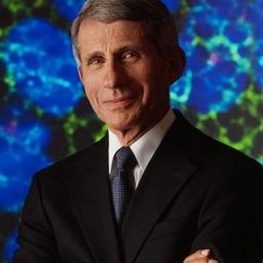Gene Therapy Restores Immune Function in Children with Rare Immunodeficiency
May 11, 2021
An experimental gene therapy can safely restore the immune systems of infants and children with a rare and deadly immune deficiency, according to research supported in part by the National Institutes of Health.

Photo: Anthony Fauci, director of NIH’s National Institute of Allergy and Infectious Diseases
Researchers at the University of California, Los Angeles and Great Ormond Street Hospital in London found that 48 of 50 children who received the gene therapy retained their replenished immune system function two to three years later and did not require additional treatments for their condition, known as severe combined immunodeficiency due to adenosine deaminase deficiency, or ADA-SCID. The findings were published in the New England Journal of Medicine.
ADA-SCID is caused by mutations in the ADA gene that impairs the activity of an enzyme needed for healthy immune system function. This impairment leaves children with the condition highly susceptible to severe infections. If untreated, the disease is fatal, usually within the first two years of life. The condition occurs in approximately one in 200,000 to 1,000,000 newborns worldwide.
People with ADA-SCID can be treated with enzyme replacement therapy, but this treatment does not fully reconstitute immune function and must be taken for life, usually once or twice weekly. Transplants of blood-forming stem cells, ideally from a genetically matched sibling donor, can provide a more lasting solution. However, most people lack such a donor. Additionally, stem cell transplants carry risks such as graft-versus-host disease and side effects from chemotherapy medications given to help the donor stem cells establish themselves in the patient’s bone marrow.
The new research evaluated an experimental lentiviral gene therapy designed to be safer and more effective than previously tested gene therapy strategies for ADA-SCID. The researchers collected stem cells from a patient’s bone marrow or peripheral blood. They then inserted a normal copy of the ADA gene into the patient’s own blood-forming stem cells using a modified lentivirus virus as a vector in the laboratory. The genetically corrected stem cells were then infused back into the patient, who had received a low dose of the chemotherapy medication busulfan to help the cells establish themselves in the bone marrow and begin producing new immune cells.
Previous gene therapy approaches for ADA-SCID have relied on a different type of virus called a gamma retrovirus. Some people who have received gamma retroviral gene therapies have later developed leukemia, which scientists suspect is due to the vector causing activation of genes that control cell growth. The lentiviral vector is designed to avoid this outcome and to enhance the effectiveness of gene delivery into cells.
The results come from two phase 1/2 clinical trials in the United States and one in the United Kingdom. The U.S. trials enrolled 30 participants with ADA-SCID ranging in age from 4 months to 4 years at UCLA Mattel Children’s Hospital and the NIH Clinical Center in Bethesda, Maryland. The U.K. study, conducted at GOSH, enrolled 20 participants ranging in age from 4 months to 16 years. Most participants acquired and retained robust immune function following gene therapy—96.7 percent after two years in the U.S. studies and 95 percent after three years in the U.K. study—and were able to stop enzyme replacement therapy and other medications.
One patient for whom gene therapy did not restore lasting immune function restarted enzyme replacement therapy and later received a successful stem cell transplant from a donor. The other patient for whom the gene therapy did not work restarted enzyme replacement therapy. The lentiviral gene therapy appeared safe overall, although all participants experienced some side effects. Most of these were mild or moderate and attributable to the chemotherapy that the participants received.
“These findings suggest that this experimental gene therapy could serve as a potential treatment option for infants and older children with ADA-SCID,” said Anthony Fauci, director of NIH’s National Institute of Allergy and Infectious Diseases. “Importantly, gene therapy is a one-time procedure that offers patients the hope of developing a completely functional immune system and the chance to live a full, healthy life.”
Thanks to Pfizer, Inc., Bluebird, and Novartis Gene Therapies for their support of this article, part of our Platforms of Hope: Advances in Gene Therapy and Gene Editing series.
Author: Rare Daily Staff

Stay Connected
Sign up for updates straight to your inbox.
